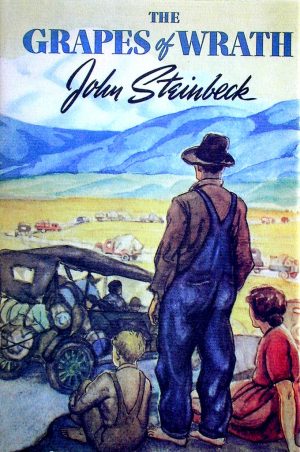The Grapes of Wrath by John Steinbeck somehow slipped through the cracks for me. I’ve spent the summer rectifying this and I can see why this novel has become such an enduring classic and a favoured choice amongst English teachers. The story of the Joad family, uprooting from their arid Oklahoma farm, fleeing poverty and industrialisation of farming in search of the American Dream is beautifully told, incredibly moving and a highly effective piece of political propaganda. If you haven’t read it yet, do. If you have, perhaps it’s time for a re-read?
After yet another crop failure and with the impending doom of industrial farming, the Joads pile their few belongings, grannies, dogs and children onto their rickety van and leave ‘The Dust Bowl’ behind. On the horizon are stable jobs, little houses with fruit orchards and picketed fences. Also known as The American Dream.
As with all Steinbeck books, The Grapes of Wrath marvel with its evocative descriptions of nature and colourful roster of characters. His portrayal of poverty is raw and real, as are the endless misfortunes that befall the Joads. Somehow, they manage to keep going, a testament to the human spirit.
Steinbeck understood that to convincingly portray destitution he needed to experience it first-hand. A socialist at heart, he went to live amongst the migrant workers in California and was shocked by how they were treated by employers, the police and local authorities. Steinbeck also understood the power of literature in influencing popular opinion and the bestselling book served as an eyeopener to the fate of hundreds of thousands of Americans (make sure you read the foreword which explains more).
…and in the eyes of the people there is the failure; and in the eyes of the hungry there is a growing wrath. In the souls of the people the grapes of wrath are filling and growing heavy, growing heavy for the vintage.
I couldn’t help thinking of our time’s economic migrants, in search of a better life in Europe, and our treatment of them while reading about the Joads. Sadly, the message of The Grapes of Wrath seems timeless.
The Grapes of Wrath is published by Penguin Modern Classics, 544 pages.





